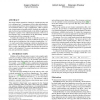Free Online Productivity Tools
i2Speak
i2Symbol
i2OCR
iTex2Img
iWeb2Print
iWeb2Shot
i2Type
iPdf2Split
iPdf2Merge
i2Bopomofo
i2Arabic
i2Style
i2Image
i2PDF
iLatex2Rtf
Sci2ools
SAC
2015
ACM
2015
ACM
Automated software winnowing
The strong isolation guarantees of hardware virtualization have led to its widespread use. A consequence of this is that individual partitions contain much software that is designed to be used in a variety of environments and by a range of applications, while in practice only a limited subset is actually utilized. Similarly, the modular design of software has contributed greatly to the ability of application developers to quickly write sophisticated programs. However, in most instances only a small fraction of the functionality included in a particular software component is needed. To address the resulting code bloat, we describe a tool OCCAM that combines techniques from partial evaluation and type theory with the goal of reducing the code in deployed applications. OCCAM can be used without annotating or otherwise modifying a program’s source. It leverages configuration-time information to produce a version of the application that is specialized to the context in which it will be ...
Related Content
| Added | 17 Apr 2016 |
| Updated | 17 Apr 2016 |
| Type | Journal |
| Year | 2015 |
| Where | SAC |
| Authors | Gregory Malecha, Ashish Gehani, Natarajan Shankar |
Comments (0)

